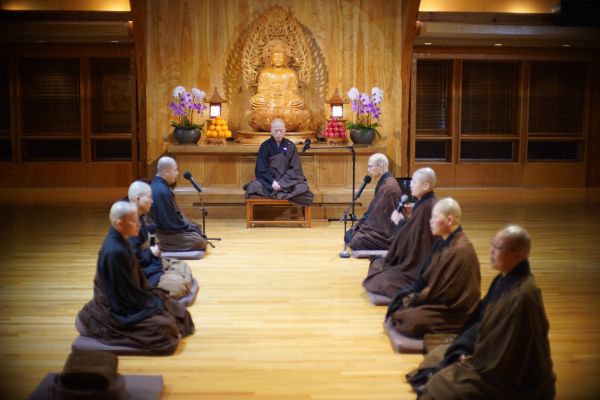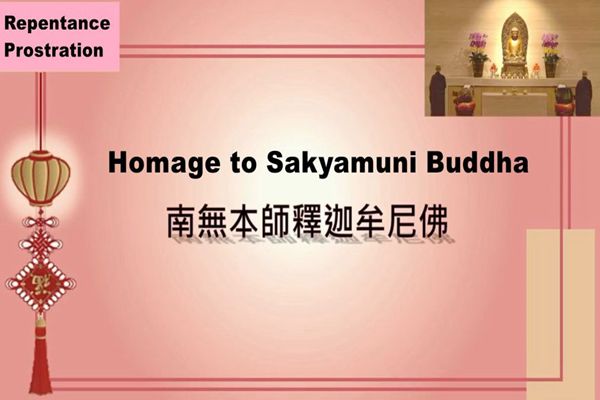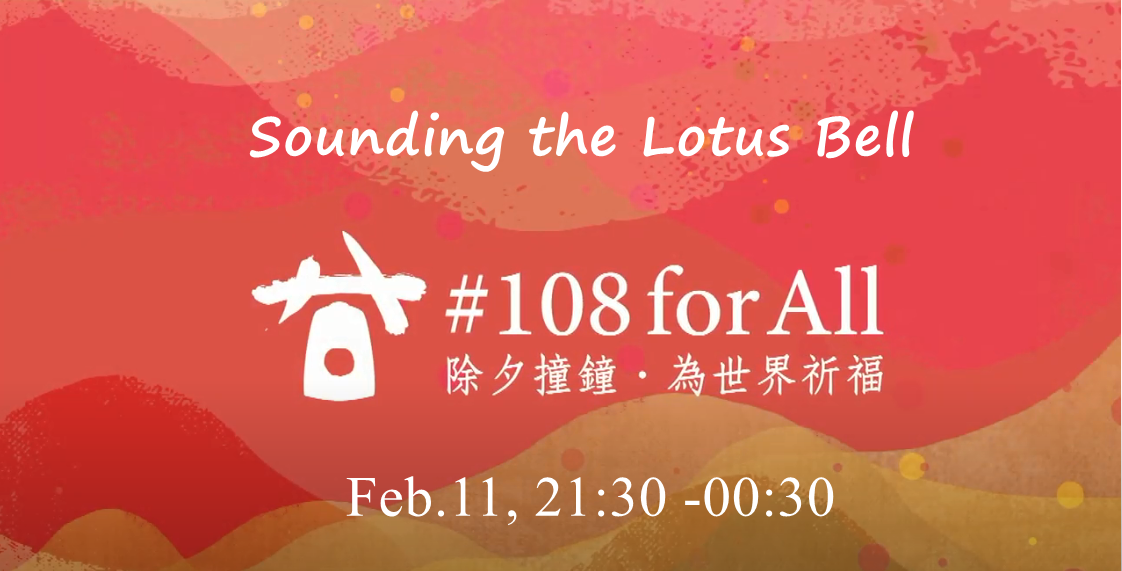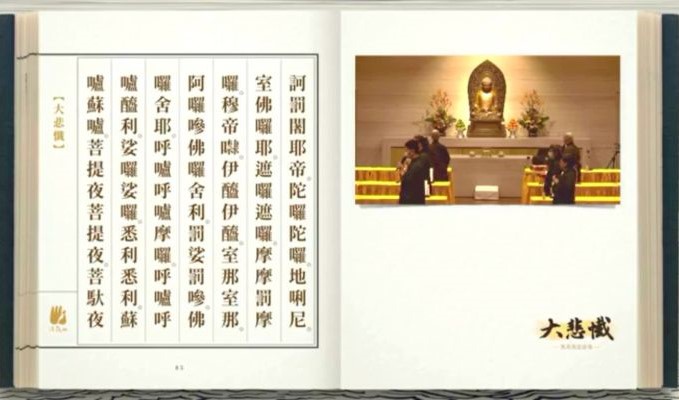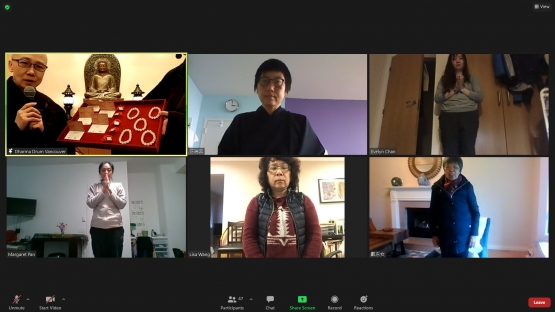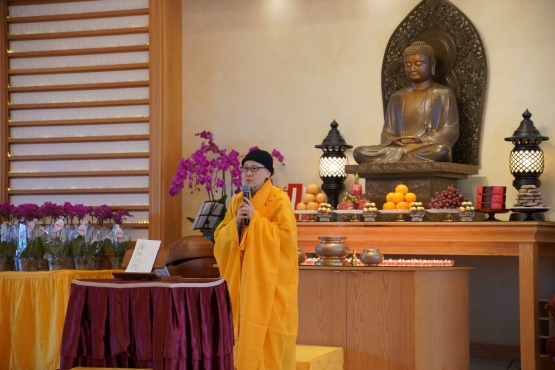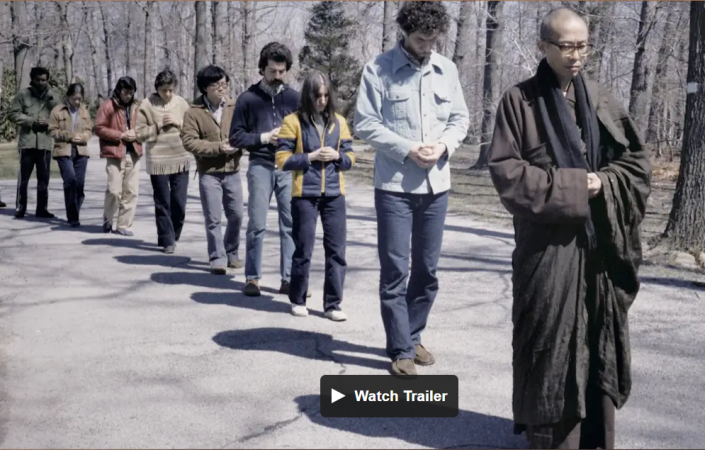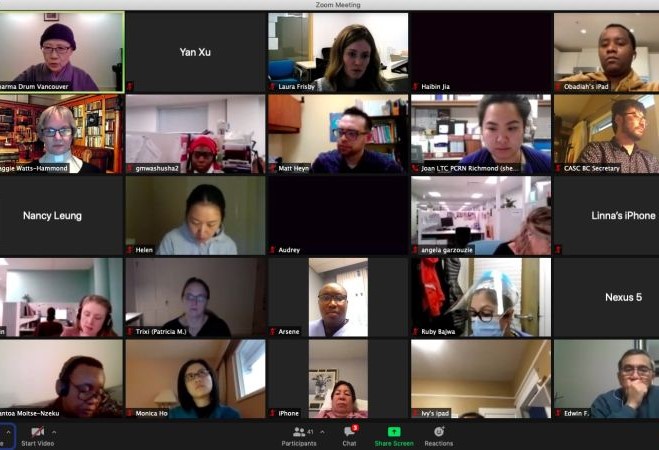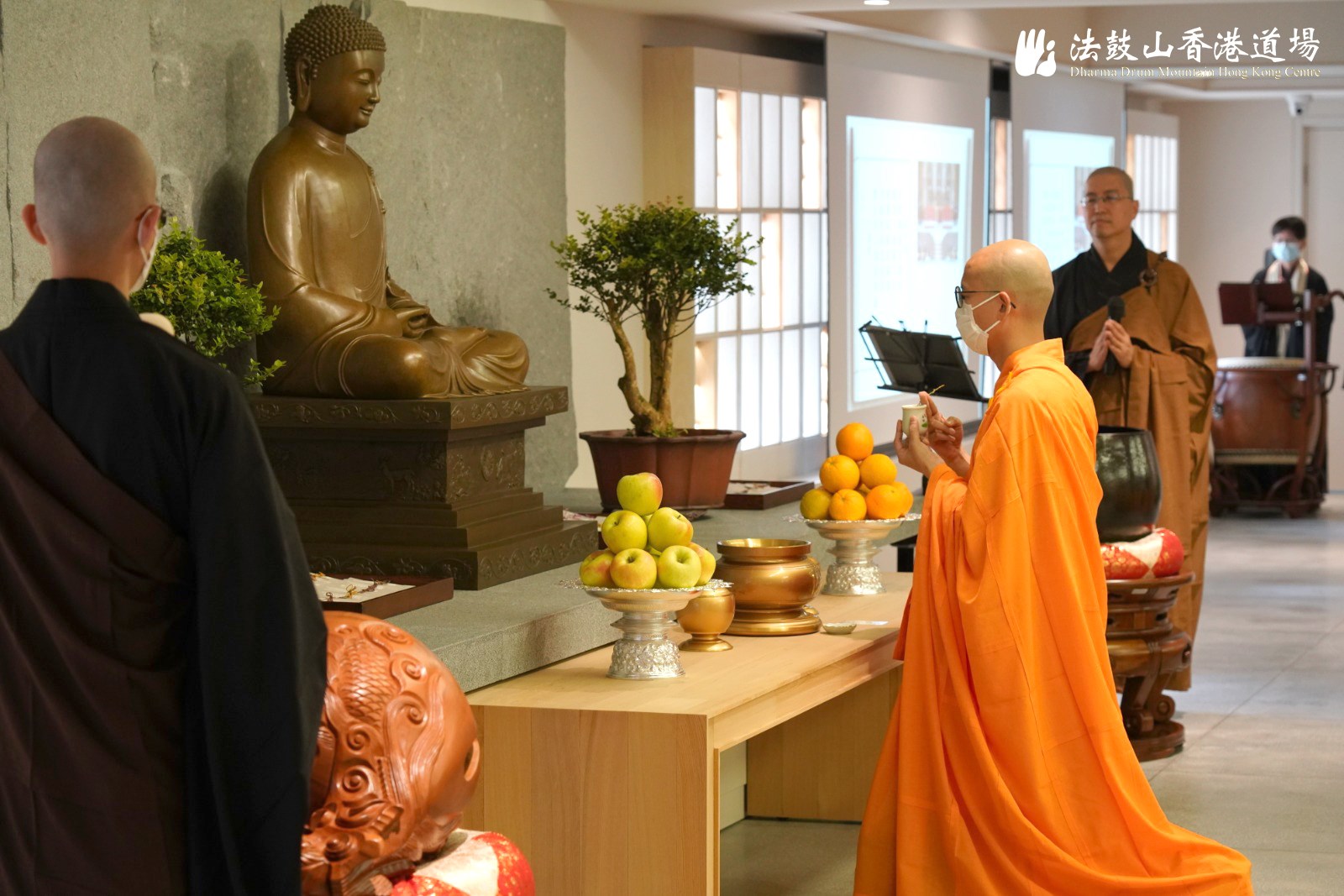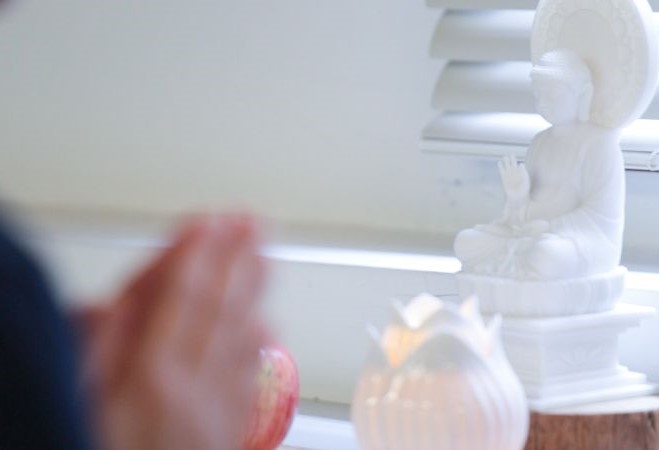News
Welcoming the New Year with 108 Recitations of the Great Compassion Mantra
On December 31, 2020, from 7 pm to 10 pm, Dharma Drum Mountain Chan Meditation Center (CMC) conducted the special event of 108 Recitations of Great Compassion Mantra Ceremony at Dharma Drum Retreat Center (DDRC) with over 400 participants in attendance. As the pandemic continues to spike in the New York home of CMC, the assembly was held via live broadcast on YouTube to avoid gathering crowds and prevent further spread of Covid-19. Led by CMC's and DDRC's monastics, practitioners earnestly recited the Great Compassion Mantra 108 times. Through this two-and-half-hour practice symbolizing ringing out the old year and ringing in the new, CMC trusted that participants could transfer the merit gained, praying for the world to enjoy peace and all beings to leave suffering behind. To open the event, Ven. Chang Hwa, director of CMC, introduced the concept and the essence of dharani upholding. Dharani, or otherwise known as mantra, has the meaning of "containing the whole&...
Online Chinese New Year Dharma Assemblies to Pray for World Peace, Safety, and Wellbeing
The 2021 online New Year Assemblies held by Dharma Drum Mountain Malaysia Centre started with the New Year's Eve Repentance Prostration Assembly and the Prayer Assembly for Peace and Safety. Due to the COVID-19 pandemic, the two assemblies were live-streamed on the Centre's Facebook page especially for devotees who are in home quarantine as required by the Movement Control Order 2.0, respectively at 9 pm on February 11 and 2 pm on February 12. On Lunar New Year's Eve, February 11, 168 participants practiced repentance prostration online, reflecting on and repenting their faults in body, speech, and mind over the past year. During the opening Dharma talk, Ven. Chang Ji remarked: "Our life is like a river. The misconducts we made in our behaviors, words, and thoughts that have intentionally and unintentionally harmed others are like the trash and sludge in the river. The trash and sludge accumulated over time will become obstacles to our practice." Using two personal experiences, the Venerable shared the impacts of both following the Precept of No-Killing and, conversely, violating the precept. She explained that our fear, anger, and misconceptions often cause us to intentionally or unknowingly hurt and bring loss to others. Therefore, we need to practice the method of repentance, as taught by the Buddha, bravely facing the "trash in the river" and cleaning it, while praying that the Buddha and the bodhisattva will witness our determination to take responsibility and avoid making the same mistakes. Chi Yueh-Hung, who attends New Year's Eve Repentance Prostration every year, said, "My tears kept rolling down, not for sorrow and grief, but because of the peace and calm I experienced while performing the prostration and recitation." Meanwhile, Huang Chun-Chieh shared by saying, "On the New Year's Eve, we should greet the coming year with a thorough spiritual cleansing, the same way we clean our homes." On February 12, the first day of the Lunar Year, 133 people attended the online Prayer Assembly for Peace and Well Being. The assembly featured the method of prostrating to the vows. It was the first time that the Centre led devotees to prostrate to the vows on the first day of the Lunar New Year. Ven. Chang Shi quoted Master Sheng Yen's Dharma talk by saying, "To have peace and safety, we must cultivate an awareness of any problems that arise. The more we are prepared, the less danger we will encounter. However, such alertness is not based on fear, because fear will more likely cause dangers." The Venerable encouraged everybody to calmly face the pandemic with an ordinary mind, accept the challenge, and remain clearly aware of it. After dealing with it using compassion and wisdom, we should let it go. As long as we can keep a calm mind when facing challenges, we'll be able to live our life with peace, joy, and well-being. She also explained that the practice is to prostrate to Sakyamuni Buddha, Medicine Buddha, Amitabha Buddha, and Guanyin Bodhisattva (Avalokitesvara). By prostrating to the vows, we can better connect to these vows and thus be inspired by them, as well as emulate the Buddhas in how they deliver sentient beings. Hsieh Pei-Wen, who attended with her family, said that the pandemic had, to varying degrees, affected herself and people around her. She hoped that "everyone can face favorable and adverse circumstances with an ordinary mind. That represents a big step forward in personal growth." Another participant, Yeh Wen-Shan, mentioned that on hearing the familiar sound of recitation, she felt as though she were right at the monastery. "I firmly believe having the Buddha-dharma in mind can always help us find a way. By performing prostration and making vows with sincerity, we can radiate positive energy for the entire year to come." The Centre hopes everybody can safeguard, bless, and care for one another so that there will be more warmth and peace in society. To take protective measures in the pandemic is to protect ourselves and others. We should certainly remain concerned, but mustn't worry too much about it. Text: Kuo Tzu-Wei(郭紫薇); Lo Chih-Hao(羅志豪) Translation: Hsiao Chen-An Editing: Chang Chia-Cheng(張家誠); Keith Brown
Sounding the Lotus Bell Online: Let's Pray for the World
After 9:30 pm (Taiwan's Time) on Lunar Year's Eve, February 11, 2021, Dharma Drum Mountain(DDM) will start to sound the Lotus Bell 108 times until midnight. It symbolizes the offering of blessings to the world as well as for praying for peace in the new year. For this year's ceremony, it is the first time that DDM launched an online warm-up campaign "#108 for all—Pray for the World" where 108 people of all works of life expressed their encouragement and blessings in an video and invited everyone to join the ceremony online. To join the Sounding Lotus Bell Ceremony, please click here
Cleaning Our Spiritual Environment, Carrying the Responsibility of Benefiting Others
Due to the pandemic, the Great Compassion Repentance Ceremony to greet the year 2021 organized by Dharma Drum Mountain Malaysia Centre was instead held online on December 31, 2020. The practice of repentance is meant to clean our spiritual environment, and practicing repentance prostrations on New Year's Eve is especially meaningful. Guided by the monastics of the center, some 200 devotees repented the negative karma they had created over the past year and prayed for the elimination of their karmic obstructions and misfortunes in the new year. At the start of the assembly, Ven. Chang Shi first introduced the origin of the Great Compassion Repentance Rite for the attendees to gain a better understanding of the practice. She said that only by repenting sincerely can one truly eradicate one's karmic obstructions. Using a personal story of Master Sheng Yen as recorded in Master Sheng Yen on Guanyin Bodhisattva's Methods, she mentioned that it was his continuous effort since childhood in practicing repentance and upholding the mantra, and thanks to the Buddhas and bodhisattvas' empowerment, that helped him overcome difficulties and obstacles. The venerable further explained that the repentance practice enables us to be more mindful of our physical, verbal, and mental acts, reminds us of our faults, and thereby changes us for the better. The content of the rite reflects the wisdom of enlightenment as realized by Avalokitesvara Bodhisattva, as well as his ten great vows and his methods of practice. It is believed that by practicing accordingly, we'll be able to attain the Path sooner, and in turn, universally deliver sentient beings. Finally, the venerable encouraged everyone by saying that the best way to eradicate our mental obstructions and external obstacles is to form good karmic affinities with people and practice repentance. The former allows us to increase in merit, and the latter helps us eradicate our karmic obstructions. As our inner negative karmic force decreases, our merits and karmic blessings will naturally increase. Text: Li Mei-Fang (李美芳) Translation: Hsiao Chen-An Editing: Chang Chia-Cheng(張家誠), Mei Beh
Seeking A Spiritual Home During the Pandemic: Online Refuge-taking Ceremony
On 10 am December 19th, 2020, five participants took refuge in the Three Jewels after the solemn weekly online Guanyin Bodhisattva Chanting Service. It was particularly meaningful that, during the severe pandemic and with other participants' blessing, they fulfilled their wish to take refuge. 123 devotees worldwide attended the online Guanyin Bodhisattva Chanting Service. Following the monastics' guidance, they chanted Guanyin Bodhisattva's Universal Gate Chapter and Great Compassion Mantra, finally praying for all people around the globe. Ven. Chang Wu encouraged everyone to learn to be others' Guanyin bodhisattvas, to grow in wisdom, and learn to view others as Guanyin bodhisattvas in order to cultivate compassion when interacting with others. She expected everyone to learn from Guanyin Bodhisattva and be a Guanyin Bodhisattva, always reaching out whenever others are in need. Given the five devotees' need to take refuge, Ven. conducted the first online Refuge-taking ceremony hosted by the DDM Vancouver Center after the chanting service. Although the ceremony took place online, it had the sincere blessings from the monastics, volunteers, and some 50 people who witnessed the ceremony online. After hearing the meaning of Taking Refuge in the Three Jewels, the refuge takers recited the refuge-taking verses to accomplish their wishes. A devotee in Scotland, Ai Huan, said that she received substantial help for inner peace from the writings of Master Sheng Yen in her early years. In October last year, her grandmother passed away and she felt deeply guilty for being unable to see her for the last time due to the pandemic. Ven. Chang Wu gave her comfort right away and encouraged her to chant Buddha's name and transfer the merit to her grandmother. This allowed Ai Huan to experience a feeling of going home in the Dharma. Having the chance to take refuge on the eve of her birthday, she regarded it as the best birthday present for herself. Hsiao Yun from Toronto has learned Buddhism for years and has benefited from it mentally and physically. After years of searching for a Chan Buddhism monastery, she finally got the chance to draw close to Dharma Drum Mountain Vancouver Center last year. She was glad that she didn't miss the chance to take refuge. Venerable Chang Wu urged the refuge takers to diligently practice and study precepts, meditation, and wisdom, learn the correct teachings of the Buddha, and put them into action in daily life. She wished that, with the Sangha and other Dharma fellows' company on the Bodhisattva Path and under the guidance of the Three Jewels, they can reduce both others' and their own vexations and receive peace, health, and joy. Text: Min, Chiu (邱敏) Photos: Dharma Drum Mountain Vancouver Center Translation: Chen-an, Hsiao Editing: Min, Shi (史敏); Jessie Goulter; Keith Brown
Peace to all from Dharma Drum Mountain Vancouver Centre
On Feb. 12 and 13 (Jan. 1 and 2 of the Lunar calendar), Dharma Drum Vancouver Center (DDVC) held two live streaming events: the New Year Offering Ceremony to Buddhas, and the Medicine Buddha Chanting Service. Under the indefinitely extended provincial stay-at-home order, the events brought consolation, warmth and strength to everyone and accompanied them in ushering in a peaceful 2021. To reflect the Year of the Ox theme, Venerable Chang Wu, Director of DDVC, used the Ten Ox-Herding Pictures to demonstrate the process of practice, thereby encouraging everyone to cherish this period of life and to move forward step by step toward Buddhahood. She reminded everyone that only by practicing the methods of liberation with a down-to-earth attitude can we accomplish our practice on the Bodhisattva Path. During the assembly, devotees performed prostrations and recitations. They also listened to the Dharma talk given by the Abbot President of Dharma Drum Mountain, Venerable Guo Huei. The monastics of the Centre, who have not interacted with devotees for a long time, gave their blessings and expressed their concerns to everyone online. Venerable Chang Min encouraged the attendees to explore their hidden abilities as well as continuously learn to let go in every situation. Venerable Chang Hui wished all the attendees peace, and that online events held by the Centre will successfully help everyone continue their study of Buddhism. Venerable Chang Wei wished everyone well and encouraged them to speak kind words, do good deeds, and make good wishes. DDVC stated that in the coming New Year, due to the situation of the pandemic in North America, the Centre will continue to provide online live streaming events to help devotees in their practice. Even though the monastery is closed, online events have unlimited spaces, and can attract attendees from all over the world. The online assemblies, retreats, and Buddhism courses in the first half of the year 2021 will take place one after another as scheduled. The Centre welcomes everyone to sponsor the activities and invite family members and friends to join in. The Centre hopes that by practicing Buddhism, not only can everyone find calm in themselves, but they can also emit peaceful energy to others in society during this time of uncertainty and malaise. Test & Photos: Dharma Drum Vancouver Center Tranlation: Hsiao Chen-An Editing: Mei Beh, Keith Brown
The Screening of Master Sheng Yen Film Inspires Overseas Viewers
Produced by Sheng Yen Education Foundation, Master Sheng Yen, a documentary on the subject of Dharma Drum Mountain's founder Master Sheng Yen's life, premiered on August 30, 2020, after more than 2 years in the making. More than 70 charitable screenings took place in Taiwan drawing over 40,000 viewers who relived the story of the Master's extraordinary contributions to the world, even overcoming the struggles and challenges he experienced in his life. The originally scheduled screening overseas was canceled due to the COVID-19 pandemic in 2020. As a consequence, the foundation organized online screenings from December 20, 2020, to January 3, 2021 in 13 countries including the US, the UK, Germany, Switzerland, Singapore, Hong Kong, and Australia. Invited to this special event were DDM's overseas volunteers, devotees, and their families and others interested in learning about how Master Sheng Yen spent his entire life devoted to the practice and propagation of Buddhism throughout the world. People were touched by the film in a variety of ways and were moved by the Master's story. After the overseas online screening, some of DDM's branches held sharing and discussion sessions online, welcoming everyone to share their reflections and ideas about the film. Ven. Chang Shy, of Dharma Drum Mountain Buddhist Center Malaysia, shared that through watching the film, she became reacquainted with the story of Master Sheng Yen. She noted in particular the Master's compassionate vows that were entirely devoid of the self and exclusively involved other sentient beings. Jessie Goulter from Australia said that the film inspired her to see Master Sheng Yen's life as an example of how to live one's own life as a Bodhisattva. It also made her grateful for the chance to learn about the Dharma through his life and his example. Albert Emily, from California, USA, shared that the film gave him a better understanding of how remarkable a person Master Sheng Yen was and the meaning behind Dharma Drum Mountain. Sung Yen-Shih, a devotee at the Dharma Drum Mountain San Francisco Bay Area Center, was inspired by promote Buddhism, which she regards as a way of showing gratitude to the Three Jewels and the Master. Many other people noted that the film, and the Master's story, will continue to bring them reflections on their lives. Sheng Yen Education Foundation stated that there will be more online screening overseas in the future. They hope that the film will bring insights, reflections and inspiration to viewers overseas. Text: Dharma Drum Mountaim Photos: Sheng Yen Education Foundation Translation: Hsiao Chen-An Editing: Mei Beh; Greg Aiani
Interfaith Hospice Palliative Care Conference
On November 26, 2020, Vancouver Coastal Health and the Richmond Integrated Hospice Palliative Care Team held an Interfaith Hospice Palliative Care conference from 3:00 to 4:00 pm. This online conference was part of a series of educational courses for health care workers with about 40 participants. Ven. Chang Wu, director of Vancouver Chan Meditation Centre, Rev. Maggie Watts-Hammond of United Church of Canada, and Fr. Robert K Wong of Roman Catholic Church shared religious based ideas, beliefs, rituals, and practices on palliative care and hospice, and finally, a Q&A session with health care workers. Rev. Matthew Heyn, as moderator of this conference, invited Ven. Chang Wu to expound on the belief and attitude towards death from a Buddhist perspective. Ven. Chang Wu explained that Buddhists do not regard death as the end of life; this period of life is part of a journey in our countless periods of life, with each period of life having its own meaning and purpose. Thus, Buddhist hospice palliative care aims to help patients move forward to the next life peacefully. Next, Rev. Maggie explained that Christians view death as homecoming and to rest in peace in God's embrace; there is neither loneliness nor fear with God's companionship along the way. She also emphasized that in the final stages of life, hospice or palliative care is irreplaceable. Fr. Wong agreed that death is the beginning of a new life and believed that God who created the world is the only one who is eternal. The three keynote speakers also elaborated on the practice of hospice palliative care. Buddhists guide the patients to let go of all attachments and to chant the name of Amitabha Buddha so that they will be at peace; with the compassionate vows of the Buddhas and the Bodhisattvas, they will be reborn in the Pure Land. Those with strong foundation in Chan meditation can do contemplative visualization as an alternative when facing death. Similar to Buddhist end-of-life chanting, Christians and Catholics pray, read scriptures, or sing hymns. The difference is that Christian or Catholic dying patients undertake confession and repentance in front of a priest or father to achieve salvation from God in order to enter heaven. Although differ in practices, all three religions place the same emphasis on death and provide religious rituals or spiritual care to the dying as well as comfort to their family. There were many questions about Buddhism in the final Q&A. Ven. Chang Wu took this opportunity to clarify the misconception that some Buddhists have when refusing painkillers, thinking that enduring pain could eliminate past bad karma. She also explained in detail regarding the Buddhist practice of not touching a dead person's body in the first 8 hours after death. This hour-long conference presented an opportunity for attendees to understand the similarities and differences between Buddhism and Christianity in the teachings and practices of hospice palliative care. Text & Photos: Dharma Drum Vancouver Centre Translation: Hsiao Chen-An Editing: Yeh Shujen (葉姝蓁); Leefah Thong
Ritual of Food Offering to Sentient Beings in the Six Destinies
During the 14th Great Compassion Water and Land Service from November 21 to 28, 2020, Dharma Drum Mountain Hong Kong Centre organized its first Food Offering to Sentient Beings in the Six Destinies, a ritual that signifies how the Buddhas and Bodhisattvas compassionately deliver sentient beings from suffering to liberation. The ritual is meant to offer food and the teaching of the Dharma to sentient beings in the six destinies of existence. Apart from practicing giving, its main purpose is to invite beings in the ghost realm to listen to Dharma talks, helping them to be delivered through the power of the Buddhas and Bodhisattvas' compassionate vows. On the concluding day of the service, volunteers worked together to deliver the food presented in the ritual, including rice, fruits, and other groceries, to various community centers, to be given to low-income families and those in need. DDM Hong Kong Centre hoped to bring loving care and warm blessings to the public, thereby inspiring others to also spread kindness in society. Prior to the service, the pandemic had brought uncertainties and challenges to the preparation work. It was thanks to the volunteers' help that these challenges were overcome, allowing the service to take place as scheduled. Embodying the spirit of equal and universal giving—the central idea of the Water and Land Service, this ritual aimed to give provisions to ghostly beings and those caused by the pandemic, as well as to send out blessings to the whole world and express care to low-income families. Also, it helped build up karmic affinity between the Three Jewels, sentient beings, donors, volunteers, and recipients of the aid. Text & Photo: Dharma Drum Mountain Hong Kong Centre Translation: Hsiao Chen-An Editing: Chang, Chia-Cheng (張家誠); Keith Brown
Send Warmth In the Cold Winter; Chan Meditation Center Helped Donate 200,000 Meals
Due to the pandemic, many people have lost their jobs, and, in the process, financial support for their families. In response to this situation, on December 16th, 2020, Chan Meditation Center (CMC), New York, under the name of Dharma Drum Mountain Buddhist Association, donated the funds received from the Water and Land Dharma Service and Winter Charity Initiative to the food bank in New York and the refugee camps and domestic violence centers in St. Louis. CMC hopes that, in spite of the impact of the epidemic, families in difficulty will still have enough food and supplies to survive the cold winter during the Christmas and New Year holidays As part of the Winter Charity Initiative, CMC normally donates the food prepared for the Food Offering ritual in Water and Land Service to the food bank at the end of the year. Since 2017, CMC has additionally started to donate the remaining funds of the service to the refugee camps and domestic violence centers in St. Louis. However, in 2020, besides donating the funds received from the service and the Winter Charity Initiative to the recipients in St. Louis, CMC also decided to donate part of the funds to the food bank instead of donating food directly, to lower the risk of infections during food delivery during the severe pandemic. This way, the food bank would take charge of the food purchase and delivery. It is estimated that there will be 200,000 meals provided to families in need. Ven. Chang Hwa, the Director of Chan Meditation Center, stated, "In 2020, the US has been impacted massively by the pandemic, and everyone is facing an unprecedented challenge. We appreciate that people of all walks of life contributed generously, putting empathy into action so that fewer people would suffer from hunger in the cold winter." Text: Chan Meditation Center Translation: Hsiao Chen-An Editing: Keith Brown

